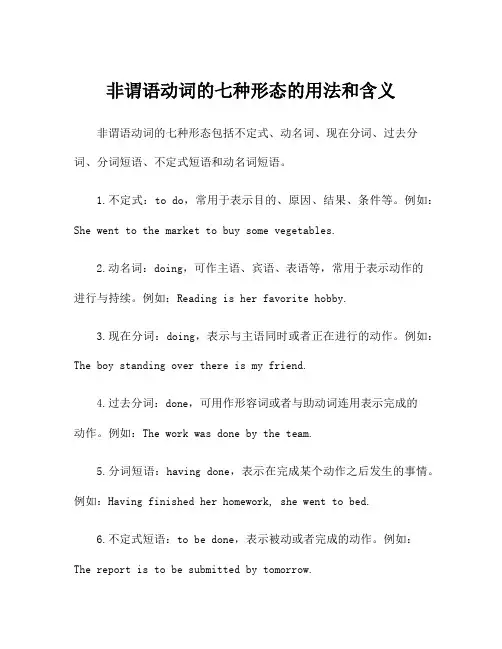第7讲 非谓语动词
- 格式:doc
- 大小:90.50 KB
- 文档页数:9


姓名,年级:时间:第七讲非谓语在写作中的运用众所周知,作文中出现过多的简单句会让人觉得单调乏味,句子与句子之间的关系显得松散;而文章中过多地出现复合句又显得累赘,读起来费劲。
恰当地运用非谓语动词对简单句和复合句进行转换,不仅使句型多样,句子活泼,而且读起来结构紧凑,言简意明.一、运用非谓语动词转换简单句1.他对这个事故一无所知,他像往常一样去上班。
He didn’t know anything about the accident。
He went to work as usual.→N ot knowing anything about the accident,he went to work as usual。
(现在分词作状语)2.被邀请来参加晚会的大多数艺术家都来自于那所大学。
Many artists were invited to the party.Most of them were from that university.→Most of the artists invited to the party were from that university.(过去分词作定语)3.他又抄袭了。
他受到了老师的惩罚.He copied again。
It made him punished by the teacher。
→His copying again made him punished by the teacher。
(动名词作主语)4.我们应该关心老年人的精神健康。
我们认为这很重要。
We should care for the mental health of the old.We think it is critical。
→We think it critical to care for the mental health of theold.(不定式作真正主语)5.我们应该如何提高我们的英语口语水平?这是个问题。



初中英语语法讲解——非谓语动词非谓语动词在句子中充当除谓语以外的句子成分的动词形式叫做非谓语动词。
非谓语动词分为三种形式:不定式,动名词,和分词(分词包括现在分词和过去分词)。
1)不定式a. 有些动词可以用动名词作宾语。
例如:2. worth 的用法worth, worthy, worthwhile都是形容词,意为"值得"。
1) worth:be worth + n.当名词为金钱时,表示"…… 值得……"常见的有It ’s worth while to do./ It ’s worth(someone’s)while doingbe worth doing sth."……某事值得被做"The question is not worth discussing again and again. 这问题不值得反复讨论。
2) worthy:be worthy of +n.当名词为抽象名词时表示"……值得……"be worthy to be done "某事值得被做"The question is not worthy to be discussed again and again.3) worthwhile:be worthwhile to do sth"值得做某事"It is worthwhile to ask him to join the club.值得邀请他加入俱乐部。
典型例题It is not ____ to discuss the question again and again.A. worthB. worthyC. worthwhileD. worth while答案C. 由worth的用法可知,此句只适合词组be worthwhile to do sth.。
选C。
动词不定式动词不定式由to+动词原形构成。




专题七非谓语动词一个简单句只能有一个动词做谓语,这个动词叫谓语动词;在这个简单句中,其他没有做谓语的动词,不管有多少个,都不能做谓语,这些动词就叫非谓语动词。
谓语动词要以谓语动词形式表达出来,非谓语动词要以非谓语动词的形式表达出来。
非谓语动词包括:动词不定式-to do动名词-doing现在分词-doing过去分词-done非谓语动词,顾名思义,就是不是做谓语的动词;非谓语动词除了不做谓语,可以做主语、宾语、定语、状语和表语等各种其他句子成分。
要掌握非谓语动词的用法,就是要掌握不同非谓语动词在各个句子成分的不同含义和用法。
一、非谓语动词的用法区别从含义上大略可以区别:过去分词-done一般表示被动、完成的意思,所以从主动和被动方面先可以把过去分词和动词不定式、现在分词、动名词区分开来。
动词不定式一般表示目的、还未发生的动作。
现在分词一般表示正在进行或与谓语动词同时发生的动作。
动名词具有名词的特性,在句中一般做主语、宾语、表语。
所以,就区别to do与doing的区别就可以了。
1、to do与doing(动名词)的区别(主要是在做主语、表语和宾语时的区别)(1)做主语和表语的区别一般来说,在表示比较抽象的一般行为或者经常性行为时多用动名词;在表示具体的某次动作,特别是将来发生的动作,多作不定式。
做主语:Smoking is prohibited here.此地禁止抽烟。
To invite him to tomorrow party is necessary.邀请他参加明天的聚会是必要的。
做表语:My job is teaching English .我的工作是教英语。
Our task now is to increase food production.我们现在的任务是增加粮食产量。
表语是以下一些词,一般用动名词做真正主语:注意:it是形式主语,动名词是真正主语。
It’s no use talking like that.It’s a waste of time arguing with him.这种句型,表语是其他词,用不定式做真正主语。

非谓语动词的七种形态的用法和含义
非谓语动词的七种形态包括不定式、动名词、现在分词、过去分词、分词短语、不定式短语和动名词短语。
1.不定式:to do,常用于表示目的、原因、结果、条件等。
例如:She went to the market to buy some vegetables.
2.动名词:doing,可作主语、宾语、表语等,常用于表示动作的
进行与持续。
例如:Reading is her favorite hobby.
3.现在分词:doing,表示与主语同时或者正在进行的动作。
例如:The boy standing over there is my friend.
4.过去分词:done,可用作形容词或者与助动词连用表示完成的
动作。
例如:The work was done by the team.
5.分词短语:having done,表示在完成某个动作之后发生的事情。
例如:Having finished her homework, she went to bed.
6.不定式短语:to be done,表示被动或者完成的动作。
例如:The report is to be submitted by tomorrow.
7.动名词短语:enjoying swimming,表示主语进行的动作是令人愉快的。
例如:She enjoys swimming in the sea.
除了以上七种形态外,非谓语动词还可以组成短语或者从句,常用于虚拟语气、句子的修饰、分句或者非限制性定语从句等。
完全掌握非谓语动词的用法对于提高英语写作和阅读水平非常重要。

易错点07 非谓语动词易错考点【01】后加动词不定式与动名词的固定用法辨析及其否定结构好多学生因为对一些固定用法掌握不牢,而用错动名词或不定式。
中考常考后接动词不定式的常考词有:begin,choose,continue,decide,expect,fail,forget,hate,help,hope,learn,manage,mean,need,offer,plan,prefer,pretend,promise,refuse,try,afford,agree,start,like等。
后加动名词的可以借助口诀来帮助记忆:完成练习值得忙(finish,practice,be worth,be busy)继续习惯别放弃(keep on,be used to,give up)考虑建议不禁想(consider, suggest, can't help, feel like);喜欢思念要介意(enjoy, miss, mind)动词不定式的否定结构:not to do sth.动名词的否定结构:not doing sth.易错考点【02】动词不定式和动名词的作主语用法辨析动名词主语多表习惯或一般,Reading in the sun is bad for our eyes.不定式作主语时,一是表目的,二是多用it 做形式主语。
It’s adj to do sth.To get there faster, you can take the taxi.易错考点【03】现在分词与过去分词的辨析1.语态区分:现分表主动或正在进行,如a moving film, developing countries过分表被动或已完成,如the moved people, the risen sun2.作宾补:宾补现分作宾补,主动关系,I heard him singing in the classroom.过分作补,被动关系。
非谓语动词语法讲解一、非谓语动词的概念动词的基本用法是作谓语。
当句中已经有了谓语动词了,要选或要填的动词就只能用非谓语形式了。
非谓语形式有三种:1、动词不定式:to do 2、动词的ing : doing 3、动词的过去分词:done二、三种形式的含义(基本用法)不定式:表示目的和将来;动词的ing:表示主动和进行;过去分词:表示被动和完成。
三、非谓语动词的时态和语态一般式完成式进行式不定式主动to do to have done to be doing被动to be done to have beendoneing 形式主动doing having done 被动being done having beendone过去分词被动done四、非谓语动词的否定形式在非谓语动词前加not, never. 即 not / never to do, not / never doing五、非谓语动词的复合结构不定式的复合结构:for / of sb. to do sth.动词 ing 形式的复合结构:宾格或所有格+doing (-ing 形式作主语时,用的所有格+doing)六、非谓语动词的做题步骤1、判定是否用非谓语形式。
方法:看看句子中是否已有了谓语动词了2、找非谓语动词的逻辑主语。
方法:非谓语动词的逻辑主语一般是句子的主语。
3、判断主被动关系。
方法:非谓语动词与其逻辑主语的主动还是被动关系。
4、判断时间关系。
方法:分析句子,看看非谓语动词所表示的动作发生在谓语动作之前、之后还是同时。
之前常用 done; 之后常用to do; 同时常用doing.学习非谓语形式时,建议把三种形式一起来比较学习,会更加有效一些。
七、非谓语动词作主语和表语的比较1、不定式和动名词作主语和表语a. 不定式表示一次性的、具体的动词。
动词ing 常表示一般的、泛指的或习惯性的动作。
如:________ is a good form of exercise for both young and old.A. The walkB. WalkingC. To walkD. Walk(分析) a good form 暗示泛指一般的行为,用动名词作主语,选 Bb. 不定式作主语时,常用it 作形式主语,即用句型:It is + adj. / n. + (for / of sb. ) to do sth.It’s important for us to learn English well.It’s kind of you to help us.注意:下面几个句型是用动名词:It’s no good / use doing sth.It’s usel ess doing sth.There is no need to do sth.2、不定式、动名词、分词作表语的比较1、不定式、动名词作表语,.表示主语的内容。
非谓语动词讲解非谓语动词: a.动词不定式b. v-ing c. 过去分词概述:1.谓语动词:在句子中担任谓语的动词2.非谓语动词:是动词的特殊形式,在句中可以作除谓语外的所有成分非谓语动词使用条件一个句子当中,已经存在一个主句(谓语动词),又没有连词的情况下, 还有别的动词出现时。
She got off the bus, leaving her handbag on her seat. She got off the bus, but left her handbag on her seat. 动词不定式一.动词不定式的时态和被动形式动词不定式是非谓语动词的一种,由不定式符号(to)加动词原形构成。
不定式的形式有五种:1.一般式to do I like to read English.2.进行式to be doing He seemed to be reading something at that time.3.完成式to have done He seemed to have cleaned the room.4.被动式to be done The work is to be done soon.5.完成被动式to have been doneThe boy is said to have been sent to hospital yesterday.疑问词+动词不定式What, who, which, where, when, how, why 等疑问词构成不定式短语,这种短语在句子中可作主语、宾语和表语等成分。
二. 动词不定式的用法I.作主语(1)不定式做主语时,可以直接放在谓语动词之前。
To see is to believe.Not to get there in time is your fault.(2)注:常用 it 做形式主语,将 to do 位于之后,使句子保持平衡。
句型 1:It + 谓语 +(+sb.)+时间/金钱+ to doIt takes us an hour _to get there by bus.It costs you only $ 100 a month to cook at home.It seemed impossible to save money.句型 2:It’s + n. (+ for sb) + to doIt’s our duty _t o_h e l p the poor.It is a great enjoyment _to_ spend our holiday in the countryside..It is a great honor for us to be present at your birthday party.句型 3:It is + adj (+ for sb) to do sth(是形容事物的性质的)It is + adj (+ of sb) to do sth(是形容人的品质的)It is easy for me t o f i n i s h this work before ten.It is very kind of you t o g i v e me some help.It's impolite of you to speak to the teacher like that.疑问词+不定式作主语When to start remains undecided.1.It is easy to get there by bus or taxi.2.It takes about 3 hours to see all the birds.3.It is also impolite to speak with your mouth full when you are eating.4.It’s our duty to take good care of the old.5.How long did it take you to finish the work?6.It is stupid of you to write down everything the teacher says.7.When to start has not been decided.8.It seemed selfish of him not to give them anything.9.It’s necessary for you to lock the car when you do not use it.10.It is useful for our health to do morning exercises.II.作宾语接不定式做宾语 I want to know this matter.I don’t expect to meet you here(1)常见动词有:like, demand, expect, promise, begin, determine, refuse, fail, manage, learn, seem, forget, want, prepare, pretend, plan, wish 等They want to get_( get ) on the bus, didn’t they?He said he wishedt o b e(b e)a p r o f e ss o r.(2)it 作形式宾语I find/feel to work with him interesting .I find/feel it interesting to work with him.Subject+ find/think/feel/make/ consider… it+adj/n + to do sth.1.We thought _it better to_ start early.2.Do you consider _it better not _to_ go?3. I feel _it_ my duty _to_ change all that.4.We think it important _ to _ obey the law.5.I know _ it _ impossible _ to _ finish so much homework in a day.(3)疑问词+不定式作宾语常常放在这些动词的后面作宾语:tell, advise, show, teach, find out, decide, discuss, learn, explain…He taught us how to use the tool.No one could tell me where to get the book.The dictionary didn’t tell the Frenchman how to pronounce the word.(4)作介词 but, except, besides 的宾语。
第七讲非谓语动词一、改正下列句子中的唯一错误:1.For the whole afternoon they sang and danced happily without think about their schoolwork.【答案】.think→thinking【解析】without为介词,其后接名词、代词或动名词作宾语。
故将think改为thinking。
2.Having something to do on the train,I couldn't help think about the scene of leaving and felt terribly sorry.【答案】.think→thinking【解析】couldn't help doing sth.为固定搭配,意为“情不自禁做某事”,故将think改为thinking。
3.With my eyes filling with tears,I came into Mr. Li's office.【答案】.filling→filled【解析】此处为“with+宾语+宾补”结构,fill与宾语eyes之间是动宾关系,故用过去分词作宾补4.In regard to protect the environment,we have many things to do.【答案】.protect→protecting【解析】in regard to意为“关于……”,其中to是介词,其后接名词或动名词。
故将protect改为protecting 5.Saw the 18 candles burning,I couldn't keep back my tears.【答案】.Saw→Seeing【解析】see在句中作状语,与主语之间存在主动关系,故用现在分词形式。
6.We finally realized it isn't easy to being a teacher .【答案】.being→be【解析】it is+adj.+to do sth.意为“做某事是……的”,it充当形式主语,真正的主语是动词不定式短语,to后加动词原形7.I am interested in your culture and want know more about it.【答案】.在want后加to【解析】want to do sth.为固定搭配,意为“想要做某事”。
非谓语动词非谓语形式(详细)动词非谓语形式一.基本概念:顾名思义,不担任谓语成分而担任其他语法功能的动词称为非谓语动词,有to do(动词不定式)/ -ing(现在分词/动名词)/ -ed(过去分词)三个形式。
由于他们不受主语人称和数的限制,故也称为"非限定动词"。
(研究中不要刻意去区分现在分词和动名词)二.非谓语动词的时态和语态意义:英语中动词有两大基本特征:时态和语态的变化。
非谓语动词也是动词,当然也具备动词的这两大特征。
1.时态概念:非谓语动词只有"过去、现在和将来"三个时间概念,他与谓语动词时态的区别是:谓语动词表示的是实际时间概念,如I am learning English.是指讲话的时候或那段时间里"我正在学英语"。
而非谓语动词的"过去、现在和将来"是指相对于谓语动词而言的"过去、现在和将来",即先于谓语动词的行为或状态称为"过去时",与谓语动词的行为或状态发生在同一时间(段)的称为"现在时",而发生在谓语动词的行为或状态之后的称为"将来时"。
这个时间概念对于后面要讲的非谓语动词的句法功能是非常重要的。
2.语态概念:与谓语动词一样,非谓语动词也有主动语态和被动语态之分。
也就是要记住四句话:(1)表示将来时;(2)表示现在时;(3)表示曩昔时(一定是被动的)(4)动词不定式的完成时表示过去时非谓语动词的上述时态和语态概念是理解非谓语动词句法功能、应试判题和翻译的基础。
请你判断一下,下面句子中的非谓语动词是什么时态和语态:Your duty is to look after the sick child。
(你的责任是照料这个病孩。
将来/主动)The sick child needs to be looked after by a special person。
第7讲非谓语动词[深化认知]一、非谓语动词作状语1.不定式作状语(1)动词不定式可以用作目的状语。
注意其他非谓语动词形式不能用作目的状语。
To succeed, one must first of all believe in himself.要想成功,首先必须相信自己。
(2)only to do sth.为不定式作结果状语,表示出乎意料的结果。
We hurried to the station, only to be told that the train had left.我们急匆匆赶到车站,结果被告知火车已开走了。
(3)形容词或过去分词作表语时,后面可接不定式作原因状语。
常见的形容词有:happy, lucky, glad, sorry, anxious, proud, disappointed, angry, surprised, ready, delighted, clever, foolish, pleased, fortunate, right等。
You will never know how happy I was to see her yesterday.你永远不会知道昨天看到她时,我是多么高兴。
(4)在“主语+系动词+表语(形容词)+t o do”结构中,不定式的主动形式表示被动意义。
该结构中常用的形容词有:easy, hard, difficult, important, impossible, interesting, pleasant, nice, comfortable, safe, dangerous等。
The chair looks rather hard, but in fact it is very comfortable to sit on.这把椅子看上去很硬,但实际上坐上去很舒服。
2.分词作状语(1)作状语的分词要求其逻辑主语与句子的主语保持一致。
One evening Harry phoned me, asking me to come to his flat as soon as possible.一天晚上哈里给我打电话,要求我尽快去他家。
(2)若句子的主语是分词动作的发出者,就用现在分词形式(doing)。
Not knowing his address, I can't call on him in person.由于不知道他的地址,我无法亲自去拜访他。
(3)若句子的主语是分词动作的承受者,则要用过去分词(done)。
Seen from the top of the mountain, the city is very beautiful.从山顶上看,这座城市很漂亮。
(4)若现在分词的动作发生在谓语动词所表示的动作之前,则用现在分词的完成形式(having done)。
Having lived in New York for years, I know each part of it very well.由于住在纽约多年,我对这里的每一处都很熟悉。
(5)若与句中主语之间为逻辑上的动宾关系,且先于谓语动词动作发生,用现在分词完成式的被动形式(having been done)。
Having been ignored for a long time, the boy sitting at the back felt bored and went out.因长时间被忽视,坐在后面的男孩感到枯燥就出去了。
3.独立成分作状语有些分词或不定式短语作状语,其形式的选择不受上下文的影响,称作独立成分。
常见的有:generally speaking 一般来说frankly speaking 坦白地说judging from/by 根据……来判断considering .../taking ...into consideration 考虑到……to tell you the truth 说实话seeing 鉴于/由于……supposing 假设,如果assuming 假使given 考虑到,鉴于provided (that ...) 如果Generally speaking, the family, not the school, plays the primary role in educating children for life.一般来讲,在孩子的终生教育中起着主要作用的是家庭而不是学校。
Considering your health, you'd better have a rest.考虑到你的健康,你最好休息一下。
二、非谓语动词作宾语1.下列动词只能用不定式作宾语,请牢记下面的口诀:She pretended not to see me when I passed by.当我经过时,她假装没看见我。
2.下列动词或词组只能用动名词作宾语,请牢记下面的口诀:这个年轻人承认驾驶了这辆没有保险的轿车。
3.be used/accustomed to, lead to, devote to, stick to, object to, get down to, pay attention to, can't stand (无法忍受), give up, feel like, insist on, apologize for, be busy (in), have difficulty/trouble (in), have a good/wonderful/hard time (in), spend (in)等短语后也要用动名词作宾语。
Parents should pay more attention to the cases where their children have difficulty (in) adapting to new surroundings.当孩子们对新环境不适应时,父母们应多加关注。
4.下列动词或词组既可以接动名词作宾语,也可以接不定式作宾语,但意义上有区别:mean ⎩⎪⎨⎪⎧to do sth. 打算做某事doing sth. 意味着做某事forget ⎩⎪⎨⎪⎧to do sth. 忘记去做某事(未做)doing sth. 忘记做过某事(已做) regret ⎩⎪⎨⎪⎧to do sth. 对即将做的事表示遗憾(未做)doing sth. 对做过的事表示后悔(已做) try ⎩⎪⎨⎪⎧to do sth. 尽力去做某事doing sth. 试着做某事 go on ⎩⎪⎨⎪⎧to do sth. 继续做另一件事doing sth. 继续做原来做的事 remember ⎩⎪⎨⎪⎧to do sth. 记着去做某事(未做)doing sth. 记着做了某事(已做) What a poor memory !I forgot borrowing money from him yesterday.But today I forgot to return the money to him.多么差的记忆力!昨天我忘了向他借过钱,但今天我又忘了把钱还给他。
三、非谓语动词作宾补1.感官动词(词组)see, watch, observe, look at, notice, hear, listen to, feel 的宾语补足语有四种形式,以see 为例:see +宾语+⎩⎨⎧ ⎭⎪⎬⎪⎫doing 看见……正做……do 看见……做了……(宾语与宾补之间为主动关系) ⎭⎪⎬⎪⎫being done 看见……正在被做done 看见……被做(宾语与宾补之间为被动关系) I looked up and noticed a snake winding its way up the tree to catch its breakfast.我抬头看,注意到一条蛇正沿树蜿蜒而上,捕捉它的早餐。
2.使役动词make, let, have, get 后加复合宾语的情况:(1)make +宾语+⎩⎪⎨⎪⎧do 让……做……(宾语与宾补之间为主动关系)done 让……被做(宾语与宾补之间为被动关系)She tried her best to make herself heard .她尽最大努力让自己被别人听见。
(2)let +宾语+⎩⎪⎨⎪⎧do 让……做……(宾语与宾补之间为主动关系)be done 让……被做(宾语与宾补之间为被动关系)Let those in need understand that we will go all out to help them.让那些需要(帮助)的人明白我们会尽全力去帮他们。
(3)have +宾语+⎩⎪⎨⎪⎧⎭⎪⎬⎪⎫do sth.使……做某事doing sth.使……持续做某事(宾语与宾补之间为主动关系)done 使……被做(宾语与宾补之间为被动关系) He had the light burning all night, which made his parents very angry.他让灯亮了整晚,这使他父母很生气。
[名师指津] have 还可用于have sth.to do/to be done 结构,该结构中have 作“有”讲,不定式作定语。
I have a lot of readings to complete before the end of this term.这个学期结束前,我有很多阅读要完成。
(4)get +宾语+⎩⎨⎧⎭⎪⎬⎪⎫to do 使……做……doing 使……开始做……(宾语与宾补之间为主动关系)done 使……被做(宾语与宾补之间为被动关系) Alexander tried to get his work recognized in the medical circles.亚历山大试图使他的工作被医学界认可。
四、非谓语动词作定语1.现在分词(短语)作定语与所修饰的名词之间存在着主动关系,表示该动作的主动和进行。
Laura was away in Paris for over a week.When she got home, there was a pile of mail waiting for her.劳拉去巴黎待了一周多的时间。
当她返回家的时候,有一大堆邮件等着她(处理)。
2.过去分词(短语)作定语与它所修饰的名词之间是被动关系,表示该动作的被动和完成。
Tsinghua University, founded in 1911, is home to a great number of outstanding figures.建于1911年的清华大学是无数杰出人物的摇篮。